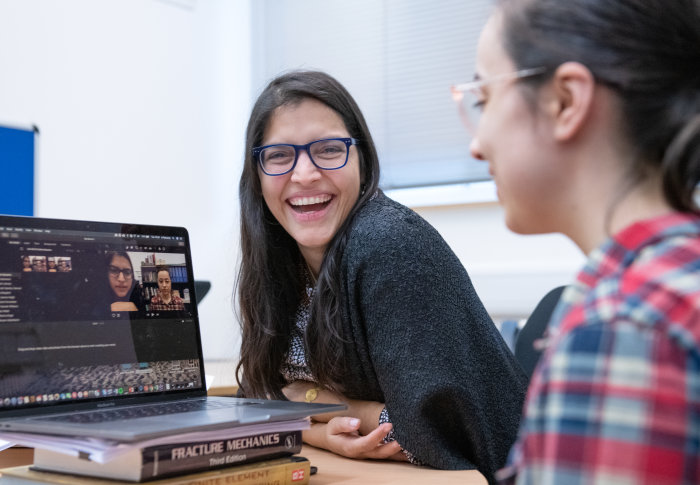Role Models for Women in Computational Science and Engineering

Dr Adriana Paluszny records a Watson Forum micro-interview
In Earth Science & Engineering, Dr Adriana Paluszny is a role model to women and promotes their various career paths to generate interest in modelling
When we say modelling, we’re not talking strutting down the runway – in science, modelling is any activity that pertains to building or creating any type of models to understand natural or artificial processes, including quantification, interpretation, prediction, simulation, and many other activities related to understanding the world. Models can be physical, theoretical, computational for example, and they help us understand complex systems all around us.
“I want to create a database of women with careers in modelling; a place where girls that are interested in studying STEM can find role models that have chosen this path,” says Dr Paluszny.
 Many of the modellers in the Department of Earth Science and Engineering use computational modelling and numerical methods to model Earth processes, predicting occluded subsurface fractures deep in the subsurface, the development of recent and ancient tsunamis, predicting how rivers existed in the past, and simulating how meteorite collisions changed this and other planets forever. Simulating the Earth requires incorporating so many different physical processes, that the same models can be used to study biological or engineered materials, spilling into other disciplines that seek to create predictive models of physical processes.
Many of the modellers in the Department of Earth Science and Engineering use computational modelling and numerical methods to model Earth processes, predicting occluded subsurface fractures deep in the subsurface, the development of recent and ancient tsunamis, predicting how rivers existed in the past, and simulating how meteorite collisions changed this and other planets forever. Simulating the Earth requires incorporating so many different physical processes, that the same models can be used to study biological or engineered materials, spilling into other disciplines that seek to create predictive models of physical processes.
In fact, the computational geoscience expertise within the Department was part of the motivation for starting the new Applied Computational Science and Engineering MSc.
Applied Computational Science and Engineering MSc
 Deirdree Polak, one of the students on this course, enjoys the diversity of modelling options in the group projects: "The topics are very interesting - modelling meteorite flight, smooth particle hydrodynamics or machine learning - and it teaches collaboration both within the cohort and through shared coding platforms.”
Deirdree Polak, one of the students on this course, enjoys the diversity of modelling options in the group projects: "The topics are very interesting - modelling meteorite flight, smooth particle hydrodynamics or machine learning - and it teaches collaboration both within the cohort and through shared coding platforms.”
Dr Paluszny is one of the teaching staff on the MSc programme, supervising projects and teaching the advanced programming module.
“I want my students to thrive; I teach them both established and emerging techniques so that they develop skills for a range of scenarios, from creating their own start-ups through to joining well-established high-performance development teams”
A role model to modellers

Beyond the Department of Earth Science and Engineering, Dr Adriana Paluszny created the Watson Forum, a series of video micro-interviews to highlight contributions of women in the areas of numerical modelling, simulation, and programming in the context of Maths, Physics, Earth Sciences and Engineering.
The project is driven by Dr Paluszny, and supported by PhD student Haifa Al Salmi who volunteers as guest editor. The Watson Forum aims to motivate women to embark in numerical and modelling topics, and to project ‘real’ female modelling role models to the world. Many of the interviewees have hybrid careers that combine modelling with other activities, such as experimental and fieldwork.
“I want my viewers to think: “This could be me, I can do this.” It’s important to have access to ‘real’ role models, a type of STEM capital accessible to all, permanent and global. A window into the reality of women that have pursued this path, a sincere and honest view of their careers.”
A career in modelling can be very rewarding, really varied, and surprisingly flexible. The Watson Forum highlights the range of topics and working lives that modellers have, and how modelling has changed their lives.
Find out more by visiting the Watson Forum YouTube Channel, or if you fancy a career as a modeller, find out how to grow your skills in numerical methods and computation in the MSc programme.
Article text (excluding photos or graphics) © Imperial College London.
Photos and graphics subject to third party copyright used with permission or © Imperial College London.
Reporter
Victoria Murphy
Institute of Global Health Innovation